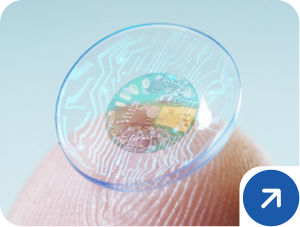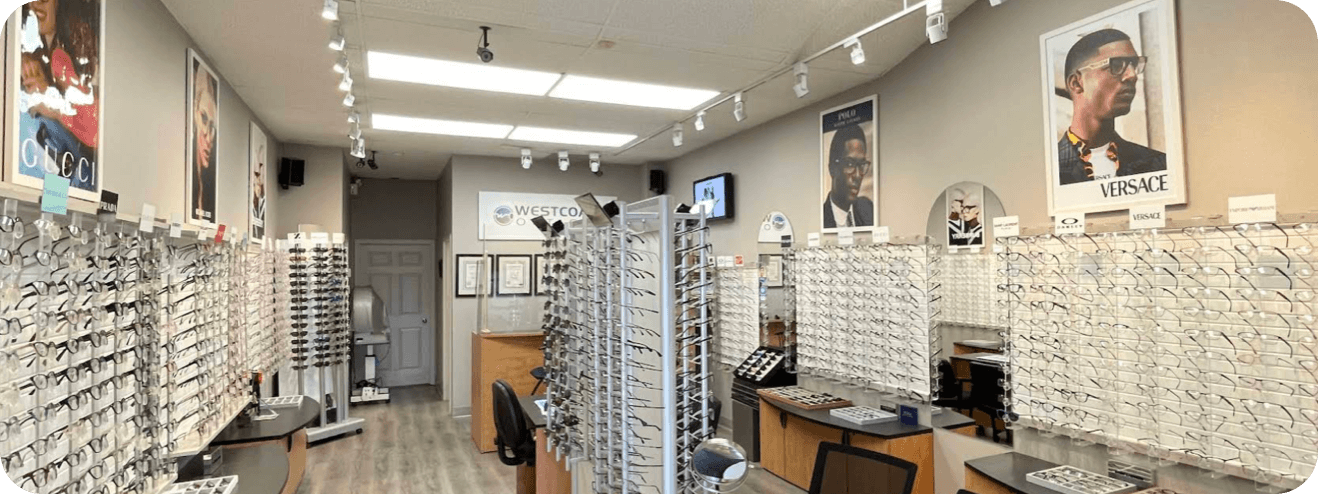We’ve all been there. You’re wrapping up your day, ready to slip into the comfort of your glasses, and suddenly—oh, no—you can’t seem to find your contact lens. But don’t worry, it’s not a serious problem and in fact, it’s pretty common to lose one. However, in some cases, a contact lens can actually get stuck in your eye. If this happens, it’s important to know how to identify the issue, and what to do if it happens to you.
If you start to develop feelings of irritation, dryness, or grittiness, that’s a good sign the lens is still in your eye. And if your eye starts watering or appearing red, it means your eye is trying to get rid of that stuck contact lens. But don’t worry, there are steps you can take to help get it out.
When in doubt, or if symptoms get worse, you should call your optometrist for advice.
Common Signs a Contact Lens Is Still in Your Eye
There’s one place to start: determining whether or not the contact lens is actually still in your eye or if it may have fallen out onto the floor or somewhere nearby.
So, how do you know if your contact lens is playing hide and seek? Look out for these signs:
- An uncomfortable sensation (like there’s sand in your eye)
- Visible redness
- Excessive tearing
- Blurred or distorted vision
- A sudden sensitivity to light
- Persistent irritation and discomfort
These are all indicators that your eye is trying to remove a foreign object—like your contact lens.
How to Check If a Contact Lens Is Still In Your Eye
If you think that it’s definitely a stuck contact lens in your eye, here’s what you should do:
- Wash your hands. Always ensure your hands are clean before touching your eyes to reduce the risk of contamination.
- Examine your eye. Look closely in the mirror. Check where the coloured and white parts meet to see if you can spot the lens. A stuck lens might also be hiding in the corner of your eye or under your eyelid.
- Insert eye drops.
- Blink rapidly or move your eye around. The movement might dislodge the lens.
Tips for Removing a Stuck Contact Lens From Your Eye
Gently massage your eyelid to encourage the lens to move. Wash your hands again (hygiene is key), and try to use a clean finger to slide the lens to the corner of your eye.
If the lens is still stuck, try using a few drops of saline solution. This can moisturize your eye and make the lens easier to move.
Don’t throw away the lens once removed. Instead, keep it aside to examine when you’re done to help you ensure you removed all pieces of the contact lens.
Why Would a Contact Lens Get Stuck in Your Eye?
Contact lenses can get stuck in the eye for several reasons, with dryness being one of the most common culprits. When the eye doesn’t produce enough natural tears, or if you’ve been in a dry or air-conditioned environment, the contact lens can become less lubricated and adhere to the surface of the eye. This is particularly common with soft contact lenses, which are designed to be flexible and mold to the shape of the eye. Without sufficient moisture, the lens can lose its mobility, making it difficult to remove.
Improper placement or warping of the lens is another reason a contact lens might get stuck in the eye. If the lens is inserted incorrectly, such as inside out or off-center, it can shift to an awkward position, like under the eyelid or on the white part of the eye. In some cases, sleeping or napping with contact lenses can cause them to dry out or move to a less accessible area, making them harder to locate and remove.
The Importance of Proper Eye and Contact Lens Hygiene
When dealing with something as sensitive as your eyes, cleanliness is one of the most important things. Before you handle your contact lenses—whether putting them in or searching for a stuck lens—washing your hands is an absolute must.
You’d be surprised at the number of germs your hands come into contact with daily. These germs can easily transfer to your lenses and then to your eyes, leading to infections. By washing your hands, you’re taking care of almost all of them and stopping them from reaching your eyes.
Keeping your contact lens case clean is equally important. Bacteria love to thrive in moist environments. So, a dirty case could become a bacterial breeding ground. Regularly wash your case and change the solution every day.
Lastly, always follow the recommended wear schedule for your lenses. Overwearing them can cause dryness, discomfort, and even eye infections. And don’t wear expired lenses. If you’re unsure of how to properly care for your contact lenses, you can always speak with your optometrist and get their professional advice.
How to Avoid Losing a Contact Lens In the Eye
To avoid losing a lens in your eye, it can help to always ensure you’re inserting them correctly. Take your time and make sure they’re sitting comfortably on your eye. And remember to never sleep with your lenses in unless they’re designed for overnight wear.

When to Talk to an Optometrist
A stuck contact lens can be irritating, but taking the right steps can help remove it safely. If your lens is stuck, don’t use tweezers or any kind of excessive force—you don’t want to damage your eye.
Reach out to your optometrist or licensed contact lens fitter immediately for assistance if you’re unsure if the lens is out. It’s better to be safe than sorry, to ensure there is no remaining lens, or any corneal abrasions.
Our team at West Coast Optical is here to help. If you’re ever unsure about your eye health, don’t hesitate to reach out or book an appointment today to speak with our team.















